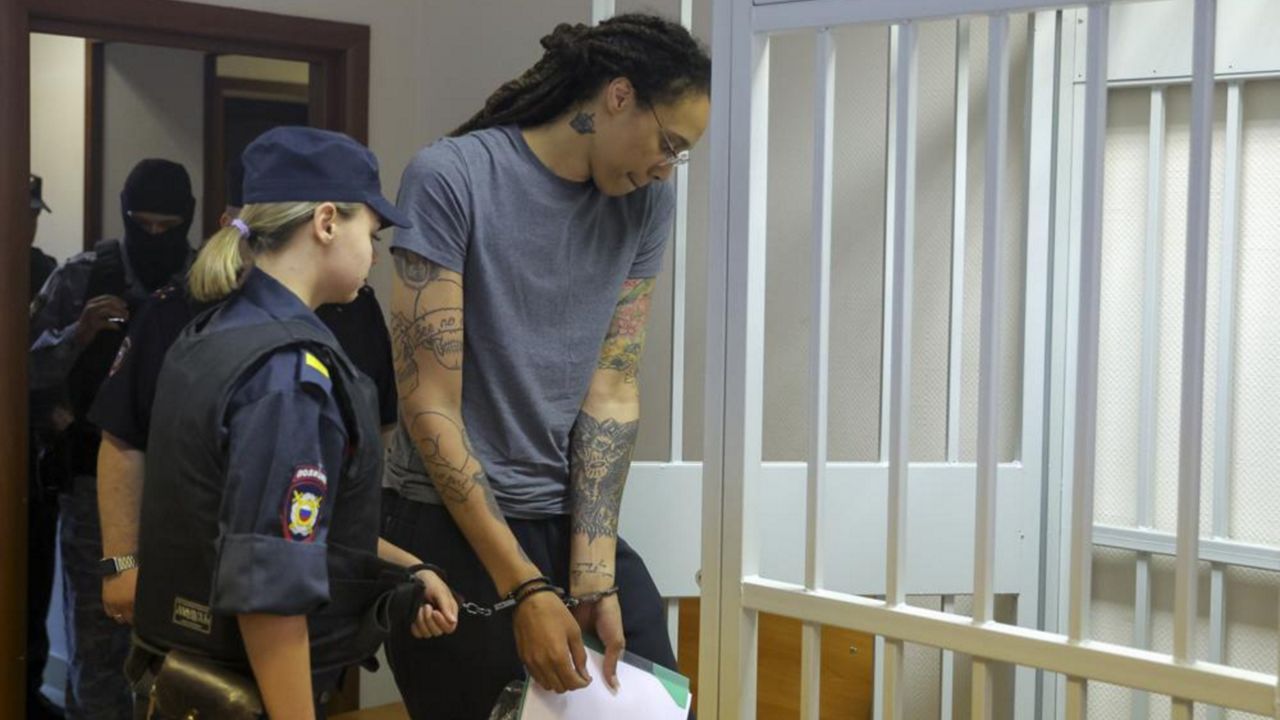A Russian court on Thursday found WNBA star Brittney Griner guilty of drug smuggling with criminal intent and sentenced her to nine years in prison.
Ahead of the verdict, Griner, who has been detained in the country for more than five months, told the court that she had no intention to break the law by bringing vape cartridges with cannabis oil when she flew to Moscow in February to play basketball.
“I want to apologize to my teammates, my club, my fans and the city of (Yekaterinburg) for my mistake that I mcartade and the embarrassment that I brought on them,” Griner said, her voice cracking. “I want to also apologize to my parents, my siblings, the Phoenix Mercury organization back at home, the amazing women of the WNBA, and my amazing spouse back at home.”
"I made an honest mistake," she said ahead of the verdict, adding: "I hope in your ruling it does not end my life.”
Judge Anna Sotnikova said the time Griner has served in custody since her arrest in February would count toward the sentence.
Attention in her case will now shift to efforts by the Biden administration to secure her release, including the possibility of a prisoner swap that would also bring Paul Whelan, an American imprisoned in Russia on an espionage conviction, back to the United States.
"Today, American citizen Brittney Griner received a prison sentence that is one more reminder of what the world already knew: Russia is wrongfully detaining Brittney," President Joe Biden said in a statement after the verdict and sentencing. "It’s unacceptable, and I call on Russia to release her immediately so she can be with her wife, loved ones, friends, and teammates.
"My administration will continue to work tirelessly and pursue every possible avenue to bring Brittney and Paul Whelan home safely as soon as possible," he added.
Last week, in an extraordinary move, Secretary of State Antony Blinken spoke to Russian Foreign Minister Sergey Lavrov for the first time since Russia invaded Ukraine, urging him to accept a deal under which Griner and Whelan would go free.
People familiar with the proposal say it envisions trading Griner and Whelan for the notorious arms trader Viktor Bout, who is serving a prison sentence in the United States. It underlines the public pressure that the White House has faced to get Griner released.
National Security Council Coordinator for Strategic Communications John Kirby on Thursday called her sentencing "reprehensible" and said Griner received a "sham trial."
"She shouldn't have even been on trial. She's wrongfully detained," Kirby said.
He also explained that the decision to make the prisoner swap offer was not made "lightly." He called it a serious offer and "an earnest attempt to see if we can get to some outcomes here."
"We're still going to keep making those attempts," Kirby added.
Russian officials have scoffed at U.S. statements about the case, saying they show a disrespect for Russian law. They remained poker-faced, urging Washington to discuss the issue through “quiet diplomacy without releases of speculative information.”
Prosecutor Nikolai Vlasenko insisted that Griner packed the cannabis oil deliberately, and he asked the court to hand Briner a fine of 1 million rubles (about $16,700) in addition to the prison sentence.
Lawyers for the Phoenix Mercury center and two-time Olympic gold medalist have sought to bolster Griner’s contention that she had no criminal intent and that the canisters ended up in her luggage by mistake. They presented character witnesses from the Yekaterinburg team that she plays for in the WNBA offseason and written testimony from a doctor who said he prescribed her cannabis for pain treatment from injuries sustained in her basketball career.
Her lawyer, Maria Blagovolina, argued that Griner used the cannabis only in Arizona, where medical marijuana is legal.
She emphasized that Griner was packing in haste after a grueling flight and suffering from the consequences of COVID-19. Blagovolina also pointed out that the analysis of cannabis found in Griner’s possession was flawed and violated legal procedures.
Blagovolina asked the court to acquit Griner, noting that she had no past criminal record and hailing her role in “the development of Russian basketball.”
Another defense attorney, Alexander Boykov, emphasized Griner’s role in taking her Yekaterinburg team to win multiple championships, noting that she was loved and admired by her teammates. He told the judge that a conviction would undermine Russia’s efforts to develop national sports and make Moscow’s call to depoliticize sports sound shallow.




